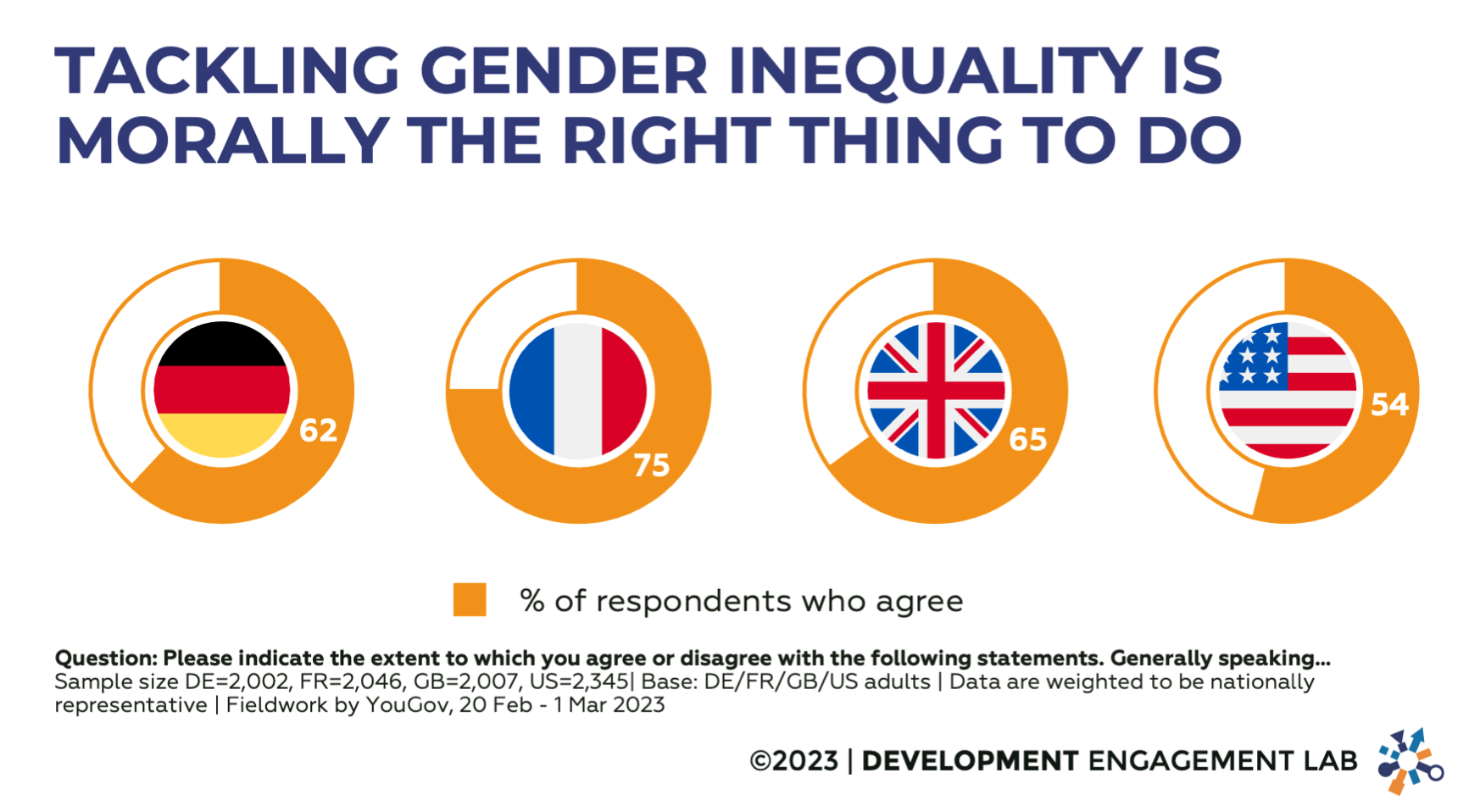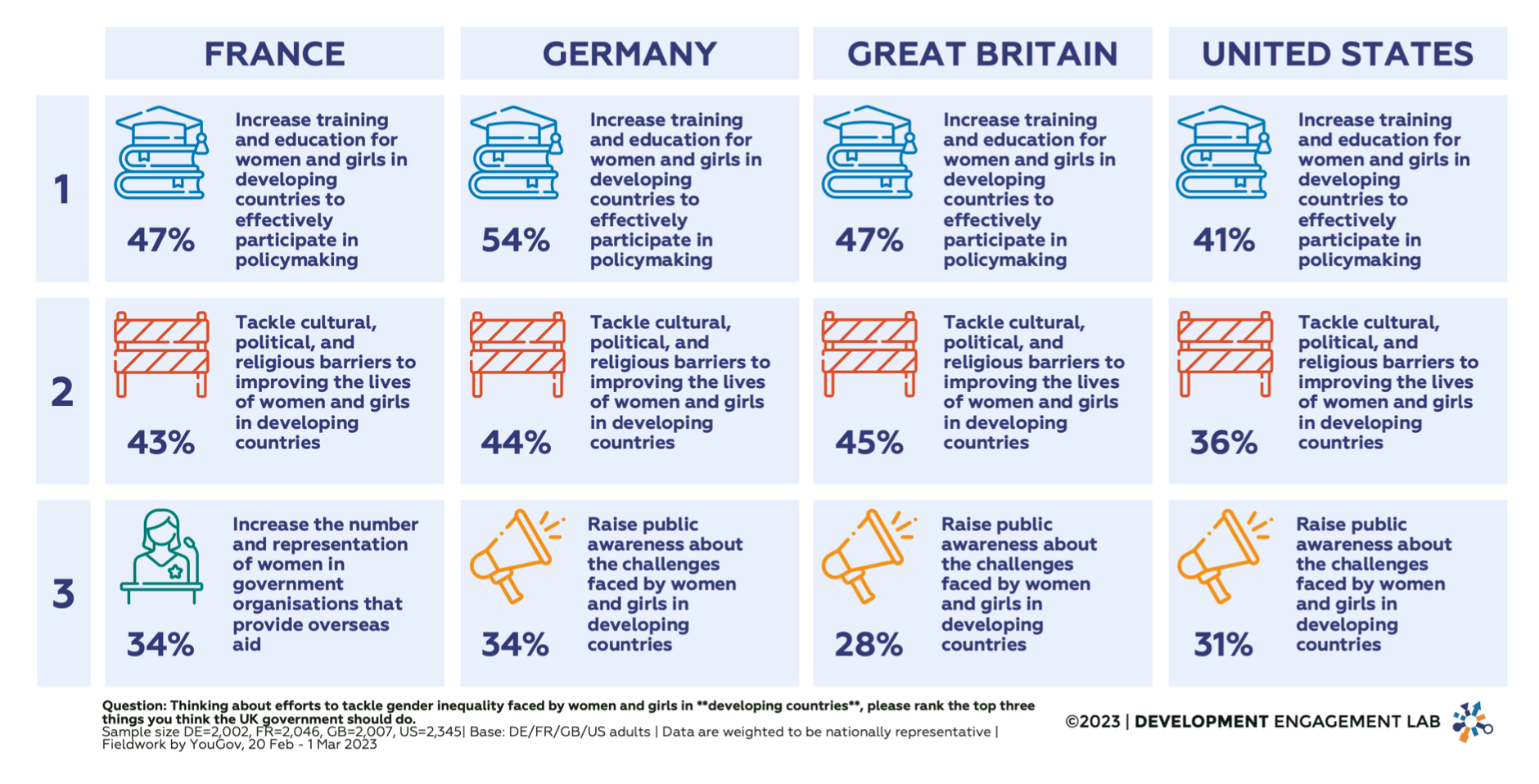Focus 2030
 Replier le menu
Replier le menu
Discover Focus 2030
Our organisation Our key programmes Our team Our partners Documentation Reports and publications News
Published 9 March 2023 in Surveys

On International Women’s Day, more than half the public believe ending discrimination against women and girls is necessary to ending global poverty.
LONDON, United Kingdom – In nationally representative surveys conducted by YouGov in Great Britain, France, Germany and the United States, the Development Engagement Lab (DEL) have found that people in all four countries believe that in order to end global poverty, the global community must end widespread discrimination against women and girls.

‘We gave respondents a number of statements around gender and gender equality and asked the extent to which they agree or disagree,’ said Jennifer Hudson, co-director of the Development Engagement Lab. ‘Over half of American respondents (51%) and nearly 6 in 10 in France (59%) think ending discrimination against women and girls is necessary to ending global poverty. In Germany and in Great Britain, 53% agree with the view’.
Hudson added that only one other statement proved more popular among the public : ‘Tackling gender inequality is morally the right thing to do, for which agreement ranges from 75% in France to 54% in the United States.’

‘We were frankly surprised to see the strength of the public’s agreement that gender equality is necessary to ending poverty,’ said Paolo Morini, Senior Research Fellow at DEL. ‘Together with our other findings, it’s a powerful message from the public that gender equality isn’t just complimentary to reducing poverty. It’s essential.’
An issue worth voting on
In another finding that surprised researchers, almost 1 in 3 in Germany, France, Great Britain and the U.S. are willing to ‘Vote in an election for a candidate who supports gender equality,’ in order to encourage the government to take action.

‘We gave respondents a range of options, including “Sign a petition,” “Boycott companies whose practices make gender inequality worse,” “Contact my MP” and “Donate,” among others,’ said Soomin Oh, Research Fellow at DEL.
‘The most popular option was “Sign a petition” in Germany, France and Great Britain, but in all four countries “Voting” makes the top two, which surprised us,’ Oh said.
What do the public want ?
The public’s enthusiasm for putting gender front and centre also extends to their views of government action : Between 40% (U.S.) and 53% (France) of the public believe the government should do either ‘a bit more’ or ‘a lot more’ to address gender inequality, both at home and abroad. By comparison, between 10% (France) and 27% (U.S.) think the government is already doing either a bit or far too much. On average, less than 1 in 4 believe the government is doing ‘the right amount.’
There is notable consensus from the public calling on the government to take action, both at home and abroad,’ Hudson added. ‘This is also true for the kinds of intervention they want to see from the government.’

Asked what actions they want their governments to take to reduce gender inequality faced by women and girls in developing countries, the publics in Great Britain, Germany, Great Britain and the U.S. agree across the board : Offered a number of interventions, 41% to 54% believe governments should ‘Increase education and training for women and girls to effectively participate in policy making.’
In a close second, publics in all four countries agree that governments should strive to ‘Tackle cultural, political and religious barriers,’ with ‘Raising public awareness about the challenges faced by women and girls in developing countries’ a close third for Germany, Great Britain. The French public, by contrast, would like to see changes within their own aid institutions, asking the government to ‘Increase the number and representation of women in government organisations that provide overseas aid.’
AVAILABLE FOR INTERVIEW : Jennifer Hudson, Director and Co-founder of the Development Engagement Lab, Professor of Political Behaviour at University College London and co-author of the report. (See full bio below)
About the Development Engagement Lab :
The Development Engagement Lab is a research organisation dedicated to examining public attitudes and engagement with global poverty. DEL is funded by the Bill & Melinda Gates Foundation and based at University College London and the University of Birmingham.
Formerly known as the Aid Attitudes Tracker, DEL conducts quantitative research in four countries : France, Germany, Great Britain and the United States.
Contributors to the survey include Jennifer Hudson, David Hudson, Soomin Oh, Paolo Morini and Felipe Torres Raposo.
About Jennifer Hudson
Jennifer Hudson is Professor of Political Behaviour at University College London (UCL) and Director of the Development Engagement Lab. She has published on a wide range of topics analysing elite and mass political behaviour, including public opinion and engagement with development ; support for foreign aid ; and parliamentary campaigns and elections. Jennifer’s research has been funded by the Gates Foundation, Economic and Social Research Council, Danish Council for Independent Research, Nuffield Foundation and Leverhulme Trust.
About Paolo Morini
Paolo Morini is a Senior Research Fellow in the Department of Political Science, University College London. As a Development Engagement Lab researcher he studies what drives public support for development aid, international cooperation and the factors affecting individual choices to volunteer time for or donate money to global poverty causes.
About Soomin Oh
Soomin Oh is a postdoctoral Research Fellow at Development Engagement Lab. Her research focuses on the political economy of development and looks at the patterns of international and domestic redistribution. She has worked on impact evaluations of development projects in collaboration with USAID and the World Bank in the West Bank, Nepal, and Tajikistan. Soomin received her PhD in Political Science from Duke University, specialising in Political Economy.
Survey : facts and figures for partners on the occasion of International Women’s Day